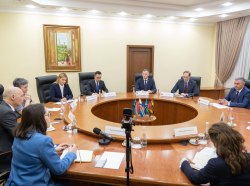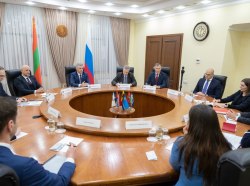Tiraspol, February 26. /Novosti Pridnestrovya/. No one wants to be responsible for the financial embargo of Pridnestrovie in Moldova. Officials shift responsibility on to each other.
Last week, information appeared that Moldovan banks did not accept Pridnestrovian enterprises` payments from their accounts with the Pridnestrovian banks. Since the end of January 2020, Pridnestrovian Republican Bank (PRB) has recorded nine refunds to enterprises from Pridnestrovie. As a result, PMR economic agents are currently unable to pay for goods and services to Moldovan residents. Such a situation has been created for the first time in 30 years of interaction between the banks of Pridnestrovie and Moldova. Previously, there were no problems with operations between residents of the PMR and Moldova. And this is exactly why the situation is unlike those problems that had to be solved before: difficulties with accounts replenishment by Pridnestrovian enterprises in banks of Moldova, limitation on external payments for goods and services.
According to the First Deputy Chairman of the PRB, Alexey Melnik, in Moldovan banks this was explained as “additional control in accordance with the principles to combat money-laundering.” The Deputy Chairman of the PRB calls this an absurd, as the topic has been discussed for a year and a half, and the Pridnestrovian enterprises` activities are absolutely transparent. “Moldovan partners, Moldovan banks have all the information about the payer, about the beneficiaries. There was provided information necessary to confirm the transaction, and more than once. Payments are made under the same contracts with the same customers as several months ago,” Melnik notes. Moreover, Melnik is perplexed: “as one of the main reasons for the refusal to make payments is the “unlicensed” banks from Pridnestrovie, then since the Moldovan bank keeps up such a payment in favor of the Pridnestrovian resident, why the anti-money laundering procedures do not interfere in this case? In 2019, funds in the amount of 3,246 million lei were transferred in such a way.”
Non-cash money can be accessed from Moldova to Pridnestrovie in one way - through the cash settlement center account in Tiraspol, opened by the National Bank of Moldova in 1995. All money received in this account is controlled by the NBM: their origin is known and the necessary control procedures have already been carried out in the framework of anti-money laundering. Therefore, Melnik emphasized that the issue of the “origin of money” was inappropriate, while he called the current situation political pressure.
The Moldovan political representative in the negotiation process, Deputy Prime Minister Alexander Flenchea blames the banks, but at the same time, he tried to get away with the explanation "that banking standards, including in the field of prevention and combating money laundering, had changed over 25 years."
“The fact that they began to return the funds transferred by the Pridnestrovian companies now, and not, say, six months or a month ago, suggests that there were no questions about the origin of the funds and the transactions themselves before, yet now there is a question. And this is the banks` concern,” Flenchea said.
But, as the Minister of Foreign Affairs of Pridnestrovie Vitaly Ignatiev said at a seminar on the banking problem on February 11, Moldovan banks interested in working with Pridnestrovie had addressed the National Bank of Moldova. In response, the financial regulator advised "to contact the reintegration bureau and the political leadership of Moldova." “Thus, the regulator admitted that there were political policies that he was forced to carry out, limiting the work of commercial banks, intimidating them,” Ignatiev said.
In the summer of last year, Moldova blocked the possibility to open accounts in banks of the Republic of Moldova for a number of Pridnestrovian enterprises. Then there were problems with currency conversion. Today, there has been added a ban on payments in MDL lei.
Experts call these steps a financial embargo, which is part of Moldova’s hybrid warfare against Pridnestrovie.
Over the past year, the negotiation process between the PMR and the Republic of Moldova has noticeably degraded. This is evidenced by the rare meetings of political representatives of the parties and expert (working) groups, as well as the failure of Chisinau to sign the protocol of the Bratislava round of the “Permanent Meeting” in the 5 + 2 format (Pridnestrovie and Moldova are parties; Russia, Ukraine, the OSCE are mediators, the USA and EU are observers).
Moldova does not comply with previously signed agreements, as telecommunications and politically motivated criminal cases have not yet been resolved. Chisinau violates the agreement on the free movement of vehicles with Pridnestrovian license plates. In January 2020, Pridnestrovian motorists were prohibited from crossing the Moldovan-Ukrainian border. Along with this, there were threats of provocation in the Security Zone at the peacekeeping posts.








